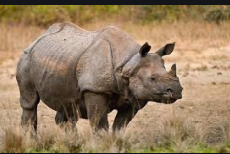Rare Javan Rhino captured on hidden camera in gleeful mudbath
A rare Javan rhinoceros has been captured on camera gleefully rolling around in the khaki, tropical waters of a national park, on the westernmost tip of Indonesia's Java island. The video of the critically endangered Javan rhino, one of only 72 left in the wild, was posted on Twitter by Indonesia's environment minister, Siti Nurbaya Bakar, and offers a rare glimpse into the life of one of the world's largest land mammals.

- Country:
- Indonesia
A rare Javan rhinoceros has been captured on camera gleefully rolling around in the khaki, tropical waters of a national park, on the westernmost tip of Indonesia's Java island.
The video of the critically endangered Javan rhino, one of only 72 left in the wild, was posted on Twitter by Indonesia's environment minister, Siti Nurbaya Bakar, and offers a rare glimpse into the life of one of the world's largest land mammals. The footage, captured by a hidden camera at Ujung Kulon's national park has been shared more than 12,000 times and shows the rhino, a male estimated to be seven years old, rolling around on his back in the muddy waters at the base of a waterfall.
The minister said that a rhino mud bath helps to regulate their body temperature and protect their skin from parasites and insects. Javan rhinos, which once lived throughout northeast India and Southeast Asia, are among the most threatened of the five rhino species.
There are only 72 Javan rhinos left in the wild, including 39 males and 33 females, according to Bakar. "Let's keep watching and loving the rhino," Bakar wrote in her viral Twitter post, "Looking after and loving them is the same as looking after and loving Indonesia."
Conservationists and researchers from the World Resources Institute in Indonesia and the Forest Wildlife Society told Reuters the government should increase monitoring of Ujung Kulon National park, and reinvigorate efforts to develop a second habitat for the critically endangered species. The population of the herbivorous mammals has declined mainly due to illegal poaching and excessive demand for rhino horn and medicine, which fetch high prices on the black market.
(This story has not been edited by Devdiscourse staff and is auto-generated from a syndicated feed.)
- READ MORE ON:
- Indonesia
- India
- Southeast Asia
- World Resources Institute
- COVID-19










